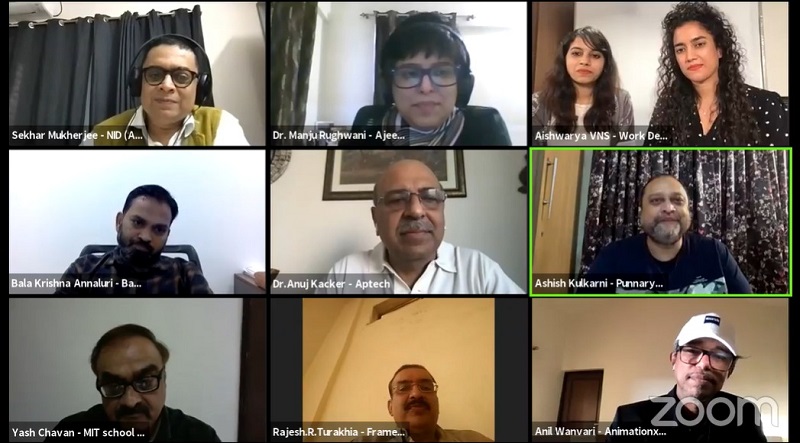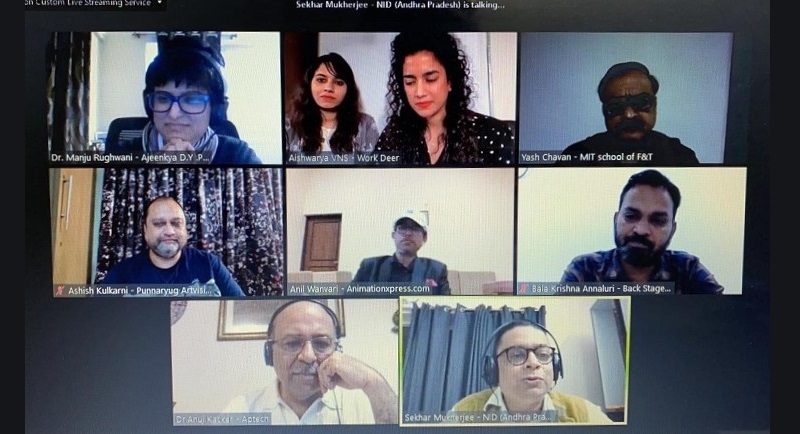
The Coronavirus outbreak has led to drastic shifts across the globe spanning several industries and sectors. The M&E (media and entertainment) industry too has seen several alterations, even the AVGC industry in India.
AnimationXpress organised a virtual round table in association with WorkDeer on ‘Creativity, Opportunity and Talent in New Normal’ that focused on how Covid impacted the education sector, what are the challenges being faced by the institutes and the students, its solutions, and more.
The panel consisted on eminent personalities from the industry such as Punnaryug Artvision founder and industry veteran Ashish Kulkarni; Aptech president and executive director Dr Anuj Kacker; Frameboxx Animation and Visual Effects founder-director Rajesh R Turakhia; NID Andhra Pradesh director, animator and graphic storyteller Sekhar Mukherjee; Backstage Pass Institute of Gaming and Technology Academics, Administration and Collaborations director Bala Krishna Annaluri; ADYPU School of Film & Media head and associate professor Dr Manju Rughwani; MIT School of Film and Television Digital Marketing head Yash Chavan and WorkDeer Marketing and Sales VP Aishwarya VNS. The interactive and fruitful session was moderated by Animation Xpress CEO and editor-in-chief Anil Wanvari.

The discussion was started by Wanvari enquiring about creativity in new normal, if they’re hopeful and looking forward to returning to institute campuses. To this, Kulkarni stated, “India is known for ‘jugaad’ and they came up with innovative ways to continue teaching, studying and go on in general amid the pandemic. In a recent survey, we found that 72 per cent of students want to come back to the campus, while 85 per cent of parents are still reluctant to send their wards. Since the start of the pandemic, a lot has happened in the AVG industry. Orissa, Tamil Nadu, Kerala, Punjab, Rajasthan, Madhya Pradesh, Haryana and others are coming up with their own associations. So the future is looking bright.”
The creativity quotient has gone to a new level as I’d like to call it ‘Quarantined Creativity’. It has kept the students occupied more as they got an opportunity to explore a lot of things, watch many films, read so many books and do research which I don’t think they got while in the University as they didn’t have that much time. I’m happy with the wonderful engagement. Students were doing amazing projects with us during the pandemic. The shift was healthy and helped educators to innovate and explore as well as engage students in more interactive sessions. In fact, students started with their own series and short films during this time. The easygoing and bold attitude of today’s millennials who are now working as freelancers, setting up their own studios and working on several projects together, that too after their class hours! This attitude will take them ahead and obviously sparks more creativity,” said Rughwani.
 Kacker noted that the pandemic brought in newness and creativity was certainly unleashed as everyone was trying hands at and creating something new, be it in the workplace, on projects. The freshness and newness was exciting.
Kacker noted that the pandemic brought in newness and creativity was certainly unleashed as everyone was trying hands at and creating something new, be it in the workplace, on projects. The freshness and newness was exciting.
Chavan focused on students and how they were involved in remote filmmaking during the lockdown and created projects, documentary films which they have been doing are going on very well. He informed, “MIT and six universities got together to fight racial discrimination, and our students are exploring on their own subjects, related to racial discrimination India. Some students are doing it online in collaboration with Hong Kong while other students are doing here. The programme is stitched together and finally, the editing is done by the Canadian students and soon we’ll have this programme of research. “
Beside the positive aspects, Annaluri pointed out the negative sides too. “Students utilised the pandemic time to the fullest. They had a great time spending time personally with many mentors personally to shape their future. But the pandemic also had negative impacts on students with a lack of resources. Their creativity was reliant on their availability of proper equipment. Being in the industry, we just can’t do away with mobile phones for online education, but we need an appropriate infrastructure,” commented he.
Kulkarni agreed with him and mentioned that the productivity increased over time through the pandemic as people took some time to settle to the new work infrastructure and set up a workstation at home. But once they did, there was no stopping for them.
Turakhia informed the panel and audience that considering these shortcomings, Frameboxx has recorded all classes and sessions to send the students separately to see that they lose out on anything. The online infrastructure has proved to be highly successful for them, however, he said that they’re eager to be back on campus to see students buzzing around, having face to face interactive sessions and looking forward to absorbing the physical vibrance and vibrations of a student-filled campus.
The pandemic has also given in to new working options and opportunities. With the economy being hit and studios being shut (both permanently and temporarily), there has been a huge surge in freelancing as students as Annaluri mentioned had been working for different clients and developed games, and shared them with teachers/mentors for reviews and feedback.

Given the tremendous rise in the culture of freelancing which the panellists spoke about and mentioned is going to be a next-big-thing, WorkDeer, is a website specially curated as the solution for students/ freelancers looking for work in the Animation, VFX and Gaming industry.
“It’s the only place where a consolidated talent pool is available exclusively for the Animation, VFX and Gaming industry. We started our website in August 2020 and the response since then has been great, which is proof that the M&E – AVG XR industry is growing exponentially. We have 3500 freelancers and 77 live projects as we speak. It’s a great opportunity to find a job to work from home as we have a full-proof payment system and no geographical limitations. Freelancers can choose their projects according to their timeline from the comfort of their home or anywhere they choose,” informed Aishwarya.
Kulkarni and others appreciated such organisations as this, they feel is the right time to prepare the students (future professionals) and make them aware of the industry and its capacity to entertain. Leveraging this would be the motto in the coming years as Kulkarni added that almost 50 per cent of the total media and entertainment industry will be from AVG XR by 2030, and the industry is expected to reach $80 bn in the next 10 to 12 years.
Wanvari shared his experience with all and commented that if one is good at his/her job, freelancers can even earn more than full-timers, as there’s a new era approaching post-COVID pandemic.
Mukherjee reiterated, “2020 has been a breather for innovation and introspection. Overall Skills are going to be crucial and perhaps we have to invent a better word than ‘freelancers’ who are like warriors without shields. They are all-timers. For us at NID, the pressure is there to keep up with the legacy. For our students and mentors, portfolios become more important than exams and that’s what’s important – practical knowledge and experience. The outcome of 2020 will be reaped in 2021 and we’re excited about it.”
As parting words, the veterans gave messages to the young aspirants, students who’re looking to get into this industry and on life in general –
“The world is opening up and we have more opportunities lined up, so be prepared for the next year. Just plan accordingly and the rest will follow. Spend the next three to five months like you have and focus on your development”: Ashish Kulkarni
“10 to 12 years later, books, theses and documents will be written on the pandemic. But that’ll be a product of time and you are living through it now. So don’t be disappointed in yourself by waiting for the pandemic to end to go ahead with your job”: Anuj Kacker
“Best practice of the past is the relevance of today. Be excited, have belief and good will happen”: Sekhar Mukherjee
“Be passionate about their work and have a nose for the umpteen opportunities that are available out there”: Yash Chavan
“Be bold, be strong. Forget 2020 existed. With difficulty comes sustaining it, and with it comes opportunities”: Manju Rughwani
“Build your portfolios, and have belief on your talents and jobs will follow”: Bala Krishna Annaluri
“Utilise your time and build your skills in such a way that you’re ready for the market anytime”: Rajesh Turakhia
